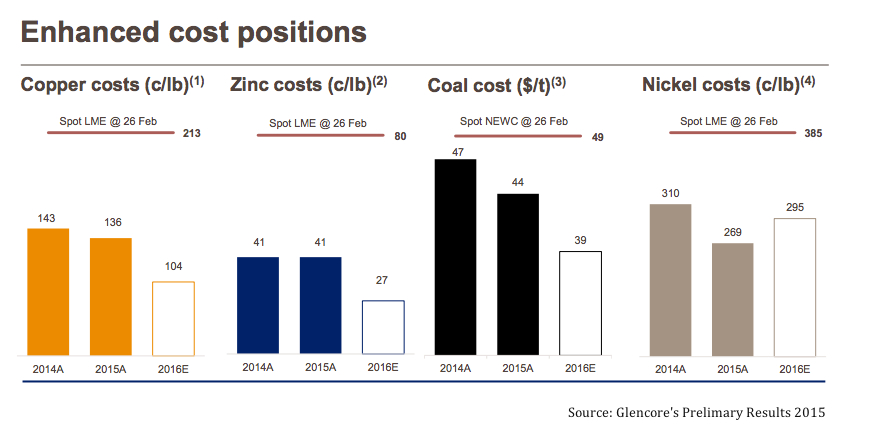Glencore swings to loss on write-downs and collapsing coal, metal prices
Beleaguered miner and commodity trader Glencore (LON:GLEN) unveiled Tuesday the extend of the damaged caused by the current mining downturn, logging an annual loss of $8 billion and $5.8 billion of charges.
The company, the second-worst performer in the FTSE 100 last year, reported a net loss of $4.96 billion compared with net profit of $2.3 billion in 2014, as the price of its key commodities - including coal and copper - hit multi-year lows.
Net debt dropped 15% to $25.9 billion at the end-December compared with a year earlier, but it still miss Glencore's target of about $25 billion. The firm's underlying profit, however, was better than expected at $1.34 billion. Analyst consensus was for a $1.17 billion.

 The Swiss-based company has decided to sell more assets this year - $4 billion to $5 billion, up from a previous goal of $3 billion to $4 billion. It is also targeting a goal in debt reduction, aiming for $17 billion to $18 billion this year compared with its previous debt target of $18 billion to $19 billion by the end of 2016.
The Swiss-based company has decided to sell more assets this year - $4 billion to $5 billion, up from a previous goal of $3 billion to $4 billion. It is also targeting a goal in debt reduction, aiming for $17 billion to $18 billion this year compared with its previous debt target of $18 billion to $19 billion by the end of 2016.
Encouraging' signs of recovery
Despite the gloomy results and the bleak state of the global mining industry, Glencore's executives were rather optimistic.
The company's Chief Executive Ivan Glasenberg said he is relatively bullish about the outlook for commodity prices after their steep recent declines considering how Glencore and other large mining groups have cut back output.
Glencore now generates most of its cash from trading as its mines and smelters around the globe struggle for profitability.While Glasenberg said he could "not guarantee" that commodity prices had bottomed, he noted there are "encouraging signs" of the market stabilizing, and argued fears of slowing demand from China were overblown.
"Our order book and sales into China, and around the world, is pretty good," he said in today's presentation. "It's not bad. Have we bottomed? I think so, though I don't want to sit here predicting prices."
Glasenberg also said his company expected to complete the sale of a minority stake in its agricultural business to a strategic investor, most likely a group of sovereign wealth funds, by the end of June.
Top miners have written off billions of dollars of assets over the past year as a result of the worst commodity price rout in a generation. BHP Billiton (ASX:BHP), the world's largest mining company, reported a $5.7 billion half-year loss last week. Brazil 's Vale (NYSE:VALE) followed suit, reporting its largest quarterly loss ever and taking $9.3bn of write-downs on nickel, coal and thermal coal assets. Earlier this month, Rio Tinto (LON, ASX, NYSE:RIO) -world's second biggest miner - also posted a loss.